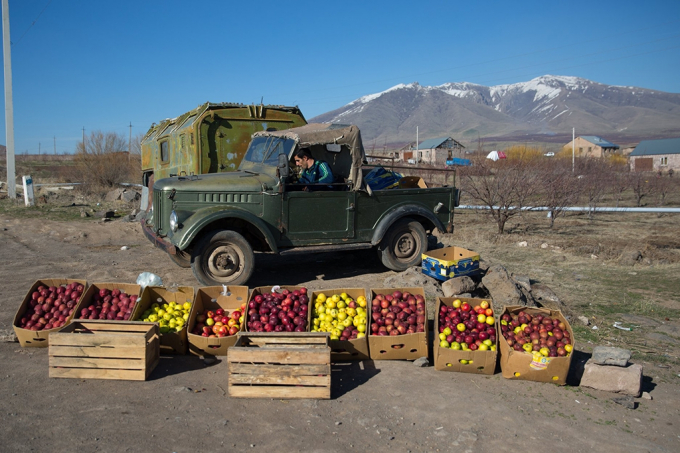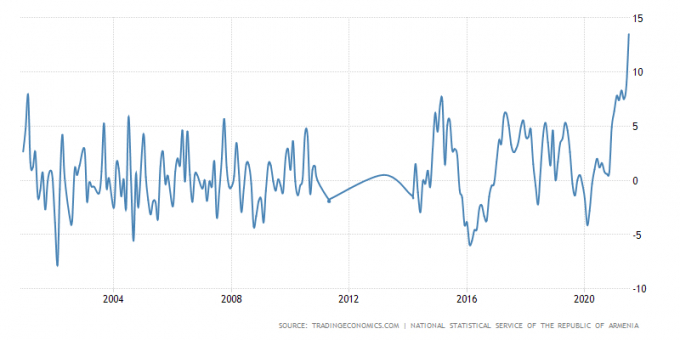June 19, 2025 | 08:25 GMT +7
June 19, 2025 | 08:25 GMT +7
Hotline: 0913.378.918
June 19, 2025 | 08:25 GMT +7
Hotline: 0913.378.918

A bad harvest is contributing to rising food prices this year. Photo: UNDP
Food prices in Armenia are rising uncomfortably high and the causes are not easy to fix: global inflation, a bad harvest, and economic depression brought on by pandemic and war.
Prices for food and non-alcoholic beverages grew 13.5 percent year-on-year in July, according to the Armenian Statistical Committee, the largest jump since at least the 1990s.

Imported goods such as cooking oil and sugar were already up by double-digit figures in recent months, but now prices for local produce are also weighing down consumers’ baskets. This summer in Armenia has been a dry scorcher, hurting harvests.
Last month, compared to July 2020, the price of bread increased by 8.6 percent, meat 9.7 percent, butter 15.9 percent, sugar 39.4 percent, eggs 51.3 percent, preserved milk 10.4 percent, and vegetables 53 percent.
Armenia’s Central Bank (CBA) says core inflation was up 8.1 percent in July year-over-year, the highest since 2011. The CBA, the guarantor of price stability, targets 4 percent.
In an attempt to tame this higher-than-expected inflation, the CBA raised its benchmark refinancing rate on August 3 for the fifth time in less than eight months. In June, the bank explained that the global economic recovery was causing the prices of essential food imports to rise and expected this "high inflationary environment" to persist in the months ahead.
That’s further stifling already weak demand.
For years, the CBA kept interest rates low to stimulate business. Now the CBA has the unenviable task of trying to keep the Armenian dram steady to moderate price increases in a low-growth environment.
GDP has been hit hard by the pandemic and the war last year with Azerbaijan. The economy contracted 7.6 percent in 2020 and the IMF expects real GDP of only 1 percent this year. That may be optimistic. The IMF had predicted food price inflation to peak in the first half of 2021 before falling to a more manageable 4 percent.
Economists are debating the CBA’s role in the crisis.
"The Central Bank, with its failed monetary policy tools, is unable to ensure price stability. In the absence of investments in the real sector such as mining [and] construction, commodity [including food] prices will continue to rise in Armenia. Even the temporary rise of the Armenian dram will not prevent the rise in commodity prices. Inflation around the world will also have an effect on Armenia," economist Suren Parsyan wrote on Facebook.
Others don’t blame the Central Bank, noting that Armenia’s situation is connected to global trends that should soon pass.
The CBA could tighten policy by raising refinancing rates “so high that money becomes expensive. Such an approach contributes to a freeze in the economy,” economist Vilen Khachatryan told local website Panorama.am. But “2021 is a year of inflation. It's happening all over the world; money is getting more expensive. The policy of our Central Bank must be synchronized with the world economy.”
After sinking in late 2020, the dram has regained value against the U.S. dollar in recent months.
That alone may not help with bread-and-butter concerns, economist Hayk Mnatsakanyan told the local website Ampop.am.
"After prices rise, they fall much more slowly. This is particularly visible in the case of gasoline prices, because importers [...] tend not to reduce prices quickly; rather they try to collect as much profit as possible," Mnatsakanyan explained, pointing to fuel prices as a particular burden for farmers.
The UN’s Food and Agriculture Organization also expects production to fall significantly.
"2021 total cereal output is forecast at about 208,000 tons, about 30 percent below the average level. Production of wheat is expected at about 120,000 tons, well below the five‑year average." Over the next year, Armenia will need to import about 20 percent more cereal above the five‑year average volume because of reduced production, the FAO said in a July briefing.
(eurasianet)

(VAN) Extensive licensing requirements raise concerns about intellectual property theft.

(VAN) As of Friday, a salmonella outbreak linked to a California egg producer had sickened at least 79 people. Of the infected people, 21 hospitalizations were reported, U.S. health officials said.

(VAN) With the war ongoing, many Ukrainian farmers and rural farming families face limited access to their land due to mines and lack the financial resources to purchase needed agricultural inputs.

(VAN) Vikas Rambal has quietly built a $5 billion business empire in manufacturing, property and solar, and catapulted onto the Rich List.

(VAN) Available cropland now at less than five percent, according to latest geospatial assessment from FAO and UNOSAT.

(VAN) Alt Carbon has raised $12 million in a seed round as it plans to scale its carbon dioxide removal work in the South Asian nation.

(VAN) Attempts to bring down the price of the Japanese staple have had little effect amid a cost-of-living crisis.